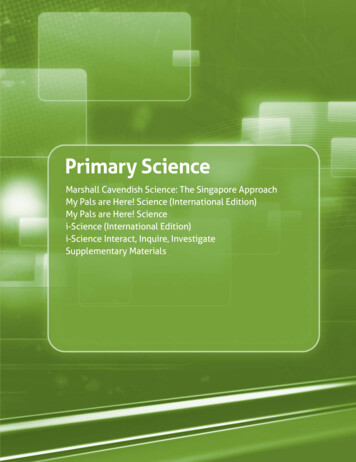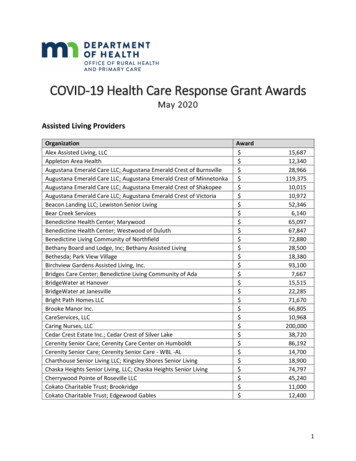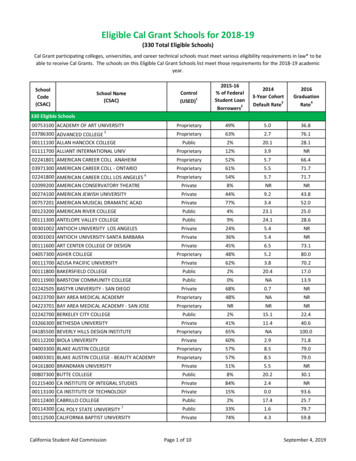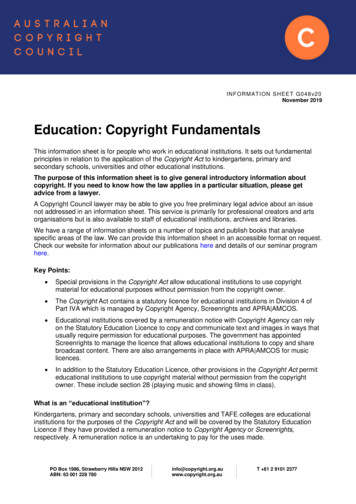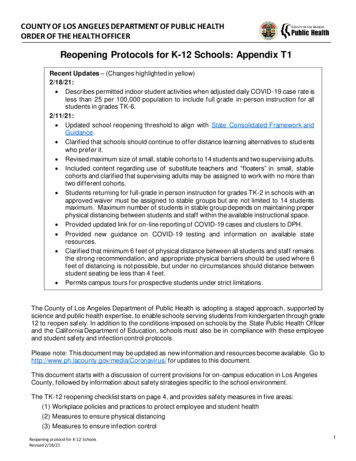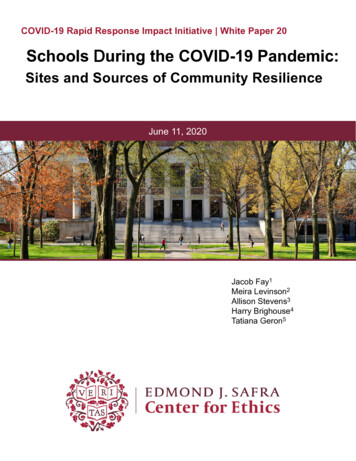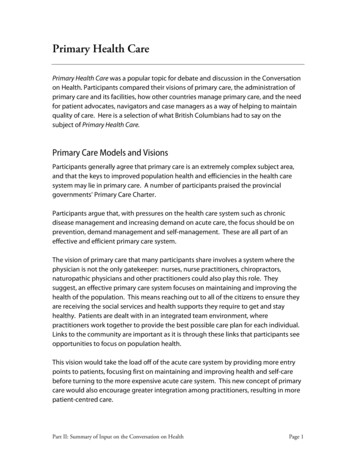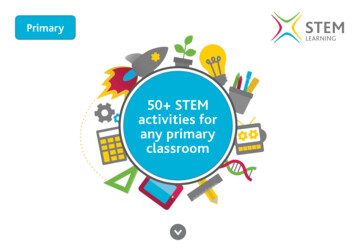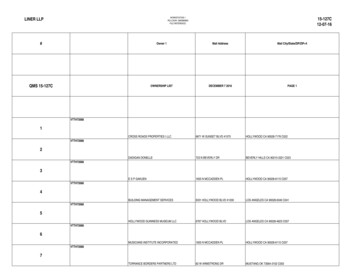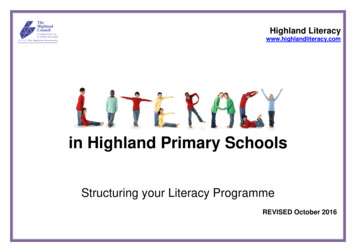
Transcription
Highland Literacywww.highlandliteracy.comin Highland Primary SchoolsStructuring your Literacy ProgrammeREVISED October 2016
Highland s resource acknowledges the work of the Highland Literacy Working Group in the form of The Highland Literacy Progression - Steps toSuccess1, The Highland Literacy Working Group - The Literacy Toolkit2 and the Highland Literacy Emerging Literacy Materials3.This resources also acknowledges the legacy of The Highland Literacy Project4 (HLP) in developing literacy in Highland schools.1CLICK HERE for The Highland Literacy Progression – Steps to SuccessCLICK HERE Highland Literacy – The Literacy Toolkit3CLICK HERE Highland Literacy – Emerging Literacy Materials4CLICK HERE to access The Highland Literacy Project (HLP) booklets2
Highland Literacywww.highlandliteracy.comBackgroundWhat is meant by literacy?In defining literacy for the 21st century we must consider the changing forms of language which our children and young people will experienceand use. Accordingly, our definition takes account of factors such as the speed with which information is shared and the ways it is shared. Thebreadth of our definition is intended to ‘future proof’ it. Within Curriculum for Excellence, therefore, literacy is defined as:the set of skills which allows an individual to engage fully in society and in learning, through the different forms of language, and therange of texts, which society values and finds useful.The literacy experiences and outcomes promote the development of skills in using language, particularly those that are used regularly byeveryone in their everyday lives. These include the ability to apply knowledge about language. They reflect the need for young people to be ableto communicate effectively both face-to-face and in writing through an increasing range of media. They take account of national and internationalresearch and of other skills frameworks. They recognise the importance of listening and talking and of effective collaborative working in thedevelopment of thinking and in learning.In particular, the experiences and outcomes address the important skills of critical literacy. Children and young people not only need to be able toread for information: they also need to be able to work out what trust they should place on the information and to identify when and how peopleare aiming to persuade or influence them.Education Scotland: Literacy across learning – Principles and practice paper5The Highland Literacy Project (HLP) provided valuable practical support for teachers of literacy in establishments across Highland. HLP’s legacyof materials and guidance are housed within The Highland Literacy blog6 for your reference as appropriate.The purpose of this document is to offer one skeleton structure. The Highland Literacy Progression – Steps to Success7 sets out a clearprogression of skills, knowledge and understanding to encompass the Literacy and English experiences and outcomes. The progression isintended to assist teachers as they plan their literacy curriculum and assess evidence of learning.5CLICK HERE to access the Literacy across learning – Principles and practice paperCLICK HERE to access The Highland Literacy Blog [www.highlandliteracy.com]7CLICK HERE for The Highland Literacy Progression – Steps to Success6
Highland Literacywww.highlandliteracy.comBuilding a Literacy PolicyThe Highland Literacy Strategy8 (2013) identifies 41 essential elements for the development of a school Literacy Policy (based on the Journey toExcellence broad areas of excellence).Writing a Literacy Policy in Primary Schools9 includes guidelines and a template which can be used to structure your school’s Literacy Policy.Building a school Literacy Policy is fundamental in ensuring that schools have a clear vision of the development of literacy within theirestablishment. These guidelines will provide you with one structure that you may wish to incorporate into Section 3 of the template10 – ‘Structureof Literacy Programmes’.Education Scotland BenchmarksThe Education Scotland Benchmarks11 set out clear statements about what learners need to know and be able to do to achieve a level. Theystreamline and embed a wide range of existing assessment guidance, including the significant aspects of learning and progression frameworks,providing a single key resource to support teachers’ professional judgement. The Benchmarks should be used to help monitor progress towardsachievement of a level and to support professional dialogue and judgement of when a learner has achieved a level.It is not necessary for learners to demonstrate evidence of every aspect of learning within the Benchmarks before moving on to the next level.However, it is important that this is interpreted in ways which ensure no major gaps in children's and young people's learning.8CLICK HERE to access The Highland Literacy StrategyCLICK HERE to access Highland Council – Writing a Literacy Policy in Primary Schools10CLICK HERE to access the Highland Council – Writing a Literacy Policy in Primary Schools - TEMPLATE11CLICK HERE to access Education Scotland Benchmarks9
Highland Literacywww.highlandliteracy.comShaping your Literacy weekOur literacy programmes should be built on the four key principles of the Highland Council Learning Policy12 – engagement, participation,dialogue and thinking.This document does not refer to individual learning resources, as schools will select resources relevant to their individual school communities.The purpose of this document is to offer one skeleton structure. The Highland Literacy Working Group has also produced guidelines onstructuring Literacy Circles within your classroom. This is a reading structure that you may feel is appropriate for the learners in your classroom.It is the presumption that learners will be developing their Literacy and English skills in some capacity each day.The timings within this document are for reference purposes only. Practitioners should use their professional judgement to allocate timings whichmeet the needs of the learners within their class.Reference to a text13 within this document should be seen in its widest sense as described by Education Scotland in the Literacy and English –Principles and practice paper.In addition to core literacy programmes, it is anticipated that literacy skills will be developed within interdisciplinary learning (IDL) contexts.1213CLICK HERE to access The Highland Council Learning Policy through GlowA text is defined by Education Scotland in the Literacy and English – Principles and practice paper. The document can be sourced by CLICKING HERE
Highland Literacywww.highlandliteracy.comLiteracy in the Early Level [P1]Highland’s Emerging Literacy materials14 will support practitioners in taking a developmental approach to emerging literacy. Within the Early Level it is crucialthat learners have the opportunity to develop the appropriate pre-reading and pre-writing skills as a solid foundation for advanced reading and writing skills tobe built upon. Concepts of Print, Oral Language, Phonological Awareness and Pre Handwriting should be included within Early Level literacy sessions.Whole ClassLesson 1No longer than 10Small GroupLesson 1Around 15 minutes,minutes. It mayinclude:Whole ClassLesson 2No longer than 10Literacy activities Vocabularyteaching Phonics Common words Skills forreading to selfand aloud Spelling Analysing andQuestioning atext Shared reading/writing Skills forindependentGroup 1 Clear teaching skill focusGroup 2Working with a partner e.g. Emerging Literacy activities Phonics games Spelling games Reading aloud Keyboard skillsGroup 3Working independently e.g. Emerging Literacy activities Word building Free writing Reading independentlyThe HLP Booklets also includestrategies, games and activities.writing14Around 15 minutes,minutes. It mayinclude:Teacher led session EmergingSmall GroupLesson 2CLICK HERE – Highland Literacy – Emerging LiteracyWhole ClassLesson 3No longer than 10Literacy activities Vocabularyteaching Phonics Common words Skills for readingto self and aloud Spelling Analysing andQuestioning atext Shared reading/writing Skills forindependentwritingAround 15 minutes,minutes. It mayGroup 2include:Teacher led session EmergingSmall GroupLesson 3 Clear teaching skill focusGroup 3Working with a partner e.g. Emerging Literacy activities Phonics games Spelling games Reading aloud Keyboard skillsGroup 1Working independently e.g. Emerging Literacy activities Word building Free writing Reading independentlyThe HLP Booklets also includestrategies, games and activities.Group 3Teacher led session EmergingLiteracy activities Vocabularyteaching Phonics Common words Skills for readingto self and aloud Spelling Analysing andQuestioning atext Shared reading/writing Skills forindependentwriting Clear teaching skill focusGroup 1Working with a partner e.g. Emerging Literacy activities Phonics games Spelling games Reading aloud Keyboard skillsGroup 2Working independently e.g. Emerging Literacy activities Word building Free writing Reading independentlyThe HLP Booklets also includestrategies, games and activities.
Highland Literacywww.highlandliteracy.comLiteracy in the First Level [P2 – P4]In Primary 2 – Primary 4, learners should be supported in developing an increasing independence. Practitioners should use their professionaljudgement as to when learners move onto this model; the Emerging Literacy materials will continue to be appropriate for many learners.Collaborative activities should continue to be built into sessions, allowing learners to explore, engage with and create texts.Whole ClassSmall GroupWhole ClassSmall GroupWhole ClassSmall GroupLesson 1Lesson 1Lesson 2Lesson 2Lesson 3Lesson 3Around 20 minutes.No longer than 10minutes. It mayNo longer than 10Around 20 minutes.minutes. It mayGroup 1include:include:Teacher led session Clear teaching skill focus VocabularyGroup 2teaching Phonics/ Spelling Common words Skills for readingto self and aloud Analysing,Working with a partner e.g. Phonics/Spelling games Reading aloud Keyboard skillsGroup 3Evaluating andQuestioning a text Shared reading/writing Skills forindependentwriting Thinking Skillsand CriticalWorking independently e.g. Language techniquetasks16 Editing/reviewing writing Reading independentlyThe HLP Booklets also includestrategies, games and activities.No longer than 10minutes. It mayGroup 2include:Teacher led session Vocabularyteaching Phonics/ Spelling Common words Skills for reading toself and aloud Analysing,Evaluating andQuestioning a text Shared reading/writing Skills forindependent writing Thinking Skills and Clear teaching skill focusGroup 3Working with a partner e.g. Phonics/Spelling games Reading aloud Keyboard skillsGroup 1Working independently e.g. Language technique tasks Editing/reviewing writing Reading independentlyThe HLP Booklets also includestrategies, games and activities.teaching Phonics/ Spelling Common words Skills for reading toself and aloud Analysing,Evaluating andQuestioning a text Shared reading/writing Skills forindependent writing Thinking Skills andCritical LiteracyCritical Literacy Decision Making Decision Making15 Decision Making16Group 3Teacher led session VocabularyLiteracy15Around 20 minutes.CLICK HERE for the SSLN Listening and Talking resource which has examples of decision making activities, including FIRST LEVEL resourcesThe HLP Knowledge about Language and Writer’s Craft booklets include language techniques which you may wish to develop Clear teaching skill focusGroup 1Working with a partner e.g. Phonics/Spelling games Reading aloud Keyboard skillsGroup 2Working independently e.g. Language technique tasks Editing/reviewing writing Reading independentlyThe HLP Booklets also includestrategies, games andactivities.
Highland Literacywww.highlandliteracy.comLiteracy in the Second Level . . . and beyond [P5 – P7]In Primary 5 – Primary 7 the independence of learners should continue to be fostered, providing them with the opportunities to further develop their criticalliteracy and thinking skills. As they make progress they should be exposed to texts of increasing complexity.Whole ClassLesson 1Small GroupLesson 1Around 20-30 minutes.No longer than 10Group 1include:Group 2teaching Skills for readingto self and aloud Spelling Analysing,Evaluating andQuestioning a text Shared reading/ Skills forindependent writing Thinking Skills andCritical Literacytexts171818Around 20-30 minutes.Working with a partner /groupe.g. Spelling games Reading aloud Vocabulary development Decision making tasks1717Working independently e.g. Language techniquetasks18 Editing/reviewing writing Reading independently Keyboard skillsThe HLP Booklets also includestrategies, games and activities.Whole ClassLesson 3No longer than 10teachingto self and aloudEvaluating andQuestioning a textGroup 2include:independent writingand Critical LiteracyLanguagetechniques withintextsAround 20-30 minutes.Group 3Working with a partner /groupe.g. Spelling games Reading aloud Vocabulary development Decision making tasks17Working independently e.g. Language techniquetasks18 Editing/reviewing writing Reading independently Keyboard skillsThe HLP Booklets also includestrategies, games and activities.Group 3Teacher led session Clear teaching skill focusteachingto self and aloudEvaluating andQuestioning a textGroup 1writingSmall GroupLesson 3minutes. It mayTeacher led session Clear teaching skill focusGroup 3writingtechniques withininclude:Teacher led session Clear teaching skill focus Vocabulary LanguageNo longer than 10Small GroupLesson 2minutes. It mayminutes. It may Decision makingWhole ClassLesson 2Group 1Working with a partner /groupe.g. Spelling games Reading aloud Vocabulary development Decision making tasks17Group 2writingindependent writingand Critical LiteracyLanguagetechniques withintextsCLICK HERE for the SSLN Listening and Talking resource which has examples of decision making activities, including SECOND LEVEL resourcesThe HLP Knowledge about Language and Writer’s Craft booklets include language techniques which you may wish to developWorking independently e.g. Language technique tasks18 Editing/reviewing writing Reading independently Keyboard skillsThe HLP Booklets also includestrategies, games and activities.
Highland Literacywww.highlandliteracy.comFurther informationThe above structural frameworks will require input from the teacher in the form of teaching learners each of the skills that are required to becomeindependently literate. Through a variation of whole-class, small group and individual activities, learners should be given opportunities to develop the literacyand English experiences and outcomes. Although not made explicit, it is presumed that learning intentions and success criteria will be shared and developedwith learners, and time will be built in for reflection and evaluation at the end of the lesson. Learners should be differentiated for appropriately and thereforegroupings should be fluid.Developing the independence of learners is integral in ensuring that learners are equipped with the skills, knowledge and understanding, and consideredliterate for the 21st century.Learners should be given a wealth of opportunities to discuss their thoughts and opinions, ask and answer questions and share their learning with the teacherand others in the class. Learners should be given the opportunity to present individually and within a group. Learners should be provided the opportunity todevelop their thinking around a text, current affairs and their own individual interests. Oral Language should be planned for. The Building Vocabulary for BetterLiteracy PowerPoint19, the Asking the Right Questions at the Right Time PowerPoint20 and the Emerging Literacy Oral Language page21 can be used tosupport you in developing oral language.Choice should be at the core of independent reading; however, for learners to choose an appropriate text to read, they must be taught the skills required toidentify a ‘good-fit’22 text. Practitioners should ensure that learners have access to a wealth of texts and are given the opportunity to analyse, evaluate andquestion the texts they’re reading independently, with a partner, or the teacher. Learners need to be taught a wealth of skills to read independently. Theseinclude reading the images, reading the words or re-telling the events. It is important that learners are taught Higher Order Thinking skills23, allowing them toexplore these through listening and talking, reading and writing activities. In writing it is integral that learners are given the opportunity to create a variety ofgenre24. Regardless of schemes which are used to support writing, it is crucial that learners are exposed to examples of the genre that they are expected tocreate. Providing the opportunity to analyse the skills that writers use and transfer these into their own work supports the read-to-write model.19CLICK HERE – Building Vocabulary for Better LiteracyCLICK HERE – Asking the Right Questions at the Right Time21CLICK HERE – Emerging Literacy Oral Language page22IPICK and BOOKMATCH [insert link] are two strategies which can be used to teach learners how to choose a ‘good-fit’ text.23The Developing Thinking and Reading Between the Lines PowerPoints can be used to develop Higher Order Thinking Skills24CLICK HERE – Highland Literacy Toolkit: Learning and Teaching – A Focus on Writing20
Skills for independent writing Thinking Skills and Critical Literacy Decision Making Around 20 minutes. Group 2 Teacher led session Clear teaching skill focus Group 3 Working with a partner e.g. Phonics/Spelling games Reading aloud self and Keyboard skills Keyboard skills Gr
